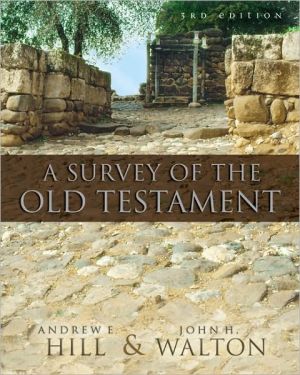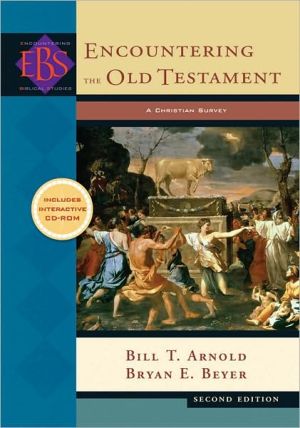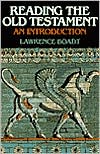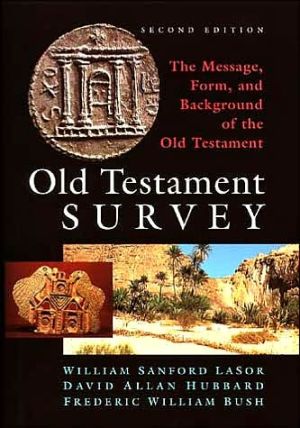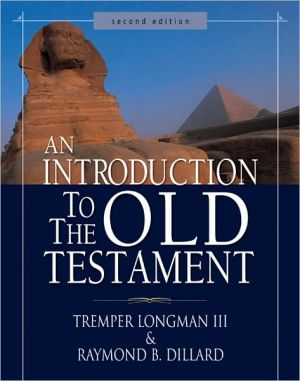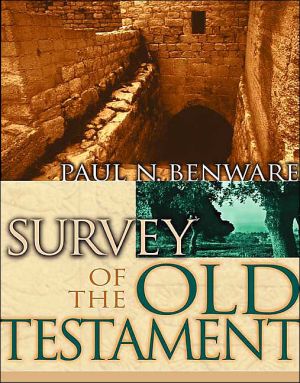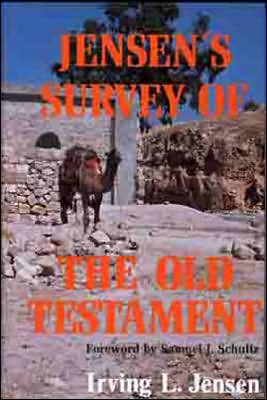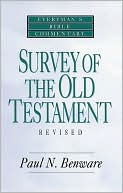A Survey of the Old Testament
The purpose of studying the Old Testament is to understand God and his redemptive work more fully. However, this goal is complicated by the fact that it was transmitted through a very different language and culture from our own. A Survey of the Old Testament provides an indispensable guide for undergraduate students and other readers by exploring the literary, historical, and theological issues behind the Old Testament and its various books.\ For each Old Testament book, the Survey addresses...
Search in google:
This widely acclaimed textbook, newly expanded and redesigned, helps readers better understand the Old Testament (and the God it reveals) by exploring the literary, historical, and theological issues behind it and behind each of its books. Helpful maps, photos, timelines, and charts now in full color.
A Survey of the Old Testament\ \ By Andrew E. Hill John H. Walton \ Zondervan\ Copyright © 2000 Zondervan\ All right reserved.\ ISBN: 0-310-22903-0 \ \ \ \ Chapter One\ Introduction to the Pentateuch\ Key Ideas\ Abrahamic covenant as Issues related to the unifying theological theme historicity of the narrative texts\ Diversity of literary types and distinctive literary features\ The term pentateuch is commonly applied to the first five books of the Old Testament: Genesis, Exodus, Leviticus, Numbers, and Deuteronomy. This Greek expression simply means "five scrolls" and apparently was popularized by the Hellenized Jews of Alexandria in the first century A.D. The Hebrew-speaking Jewish community traditionally referred to these five books as the "Torah" (or "instruction" in holiness). Other designations for the Pentateuch include the Book of the Law, emphasizing the covenant stipulations as its defining feature; and the Law of Moses, emphasizing the human mediator as its defining feature.\ The Pentateuch was the first divinely prompted literary collection acknowledged as Scripture by the Hebrew community. As such, it is the most important division of the Hebrew canon. It always stands first in the threefold division of the Old Testament: Law, Prophets, and Writings. Its supreme rank in the Old Testament canon in respect to authority and holiness is evidenced by its position and separation from the other books in the Septuagint (the Greek translation of the Old Testament). The careful translation of the Hebrew Pentateuch into Greek also confirms the high regard for the collection in the Hebrew community (in contrast to the incomplete and more loosely translated divisions of the Prophets and Writings).\ Theme and General Contents\ The "five-book" division of the Pentateuch is really a secondary partitioning of what was intended to be a unified, literary whole. The Pentateuch is better understood as a "five-volume" book, a five-part mini-series of sorts. D. J. A. Clines (1979) has convincingly argued that the Pentateuch has two basic divisions, Genesis 1-11 and Genesis 12-Deuteronomy 34. In view of the fall of humankind and the broken fellowship between God and humanity, the first division poses the question, "How can that relationship be repaired or restored?" The second division then provides an answer, or at least a partial answer, to the human dilemma depicted in Genesis 1-11. The solution is rooted in the idea of covenant bonding between God and Abram in Genesis 12:1-3. This passage constitutes the focal point of the second division and actually summarizes the key themes of the Pentateuchal narratives: Yahweh's covenant, Abraham's posterity, divine election and blessing, and the grant of a "promised land."\ Part 1 explains the origins of the earth and humankind, explains the nature and purpose of humanity created male and female, records the intrusion of sin into God's good creation, and reveals the character of God, who both judges human sin (as witnessed in the Flood account) and deals mercifully with fallen creation (as seen in the grace extended to Noah and his family).\ Part 2 explains how Israel (through Abraham) became the elect covenant people of Yahweh and God's instrument for revealing himself and restoring the broken and corrupted relationship between the Creator and his creation. The Pentateuchal accounts are significant both for Israel, due to their unique covenant relationship with Yahweh, and for the nations of the world, since the destiny of humanity is ultimately tied to Israel's covenant with God.\ The unifying theological theme of the Pentateuch is Yahweh's covenant promise to Abram in Genesis 12:3. What humankind was unable to do in all its pride and self-sufficiency (epitomized in the Tower of Babel), God initiated in his covenant promise. The literary plan of the Pentateuch is but an expansion of the three-part covenant promise extended to Abram, as outlined in figure 1.1.\ The Literature of the Pentateuch\ The Pentateuch, or Book of the Law, is a rich collection of literary genres or types. This diversity of literary types enhances both the artistic nature of the work and the key theological themes unifying the anthology. By the same token, these multiple and complex literary forms have been directly responsible for the ongoing debate over the composition and date of the Pentateuch.\ Prose Narrative\ Most of the Pentateuchal literature is prose narrative. The narrative is simple but direct and forceful. The text is largely a third-person account of early Israelite history interspersed with prayers, speeches, and other types of direct discourse (e.g., Abraham's intercessory prayer for Sodom in Gen. 18:22-33, Yahweh's speech to Moses in Exod. 3:7-12, and the exchange between Pharaoh and Moses in Exod. 10:1-21).\ The narratives artfully blend historical reporting and theological interpretation. This makes the Pentateuch more than a mere register of chronologically ordered events yet something less than pointed religious propaganda serving to explain or justify certain actions, events, institutions, or theological teachings. Perhaps the best example of this blend of historical reporting and theological interpretation is the providential understanding of Joseph's trials as benefiting all of Jacob's family (Gen. 50:15-21).\ The language of the Pentateuch is simple and beautiful. It uses anthropomorphic language (i.e., ascribing human qualities to God), and frequent reference to theophany (i.e., a visible and audible manifestation of God to a human being). The detailed characterizations and repetitious plots in the stories have led some scholars to use terms like "myth" or "saga," "folklore," and "legend" for portions of the Pentateuchal narratives (especially Genesis). Traditionally, evangelical scholars have balked at employing such labels for the Pentateuchal narratives lest the accounts be thought of as fiction. The inability of modern scholarship to define these genres or literary categories clearly has also contributed to this reluctance to use these terms. Once again, belief in the historicity of the Old Testament make some scholars reluctant to include Genesis (and the rest of the Pentateuch) in these ill-defined genres. This historical aspect of the Pentateuchal prose narratives is discussed later on.\ (Continues...)\ \ \ \ \ Excerpted from A Survey of the Old Testament by Andrew E. Hill John H. Walton Copyright © 2000 by Zondervan. Excerpted by permission.\ All rights reserved. No part of this excerpt may be reproduced or reprinted without permission in writing from the publisher.\ Excerpts are provided by Dial-A-Book Inc. solely for the personal use of visitors to this web site. \ \
AbbreviationsPrefaceImage SourcesUsing this bookPt. I IntroductionPt. II The PentateuchPt. III The Historical BooksPt. IV The Poetic BooksPt. V The ProphetsPt. VI EpilogueApp. A Critical MethodologiesApp. B The Composition of the PentateuchGlossaryIndex
